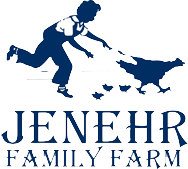Each week when Isaac gets home from work, we head off to the library. Our weekly 90- minute library expedition gives bibliophile Isaac his weekly book/cd/video fix. It gives me uninterrupted time to focus on this newsletter. During the past two weeks, the library is less than accessible due to carpet installation. No big deal you think. But in reality, this little diversion from our weekly routine is a much larger roadblock to creativity and getting the job done without distractions than I’d like to admit. It seems that you can put your brain on a performance schedule.
A change in existing habits is one thing, the harder one is creating new habits – especially with such well trained old dogs as the JenEhr farmers. This season we’re working on delegating more of the brain work to experienced members of the crew. While it seems impossible, Farmer Paul’s brain is a little overloaded with details, his day a tad over scheduled with must-do jobs and the hours of sleep available seem to be deminishing – thus delegation. But such delegation requires two things – the crew picking up the new job, falling into the schedule of routine, observation and reporting; but more difficult is letting go of those responsibilities – so someone else can take them on. It’s a process that we started early, when the farm work was less demanding and less complicated, when we had only bed preparation and planting to deal with instead of the multitude of tasks that pile on with weeding, increased harvest, trellising, irrigation and “so it goes”.
Research indicates that new habits take six weeks to establish. New habits need prompts, reminders and expectations. I’m assuming that those six weeks are for acquiring new habits as well as letting go of old ones. We’re half way through the six weeks, but expect it will take more time and coffee for this series of changes to become habitual.
The same is true with eating from your CSA share. Many of our members report that it takes three years of eating your local CSA share before it really becomes a habit – one that is easy and comfortable. By year three, you’ve developed a habit for handling your produce when you get home; you have a system for planning meals; what stores well and who in your family, office or neighborhood likes the things your share that you don’t care to eat (although even the things you care to eat change during those three years). If this is year 3+ for you, keep enjoying your hard earned habit – you’re reaping the benefits every day. If you’re in year 1-2, keep at, try different recipes, figure out what systems work for you and your family. I promise that eating fresh, local, organic and seasonally is a habit that will reward you well for the rest of your life.
